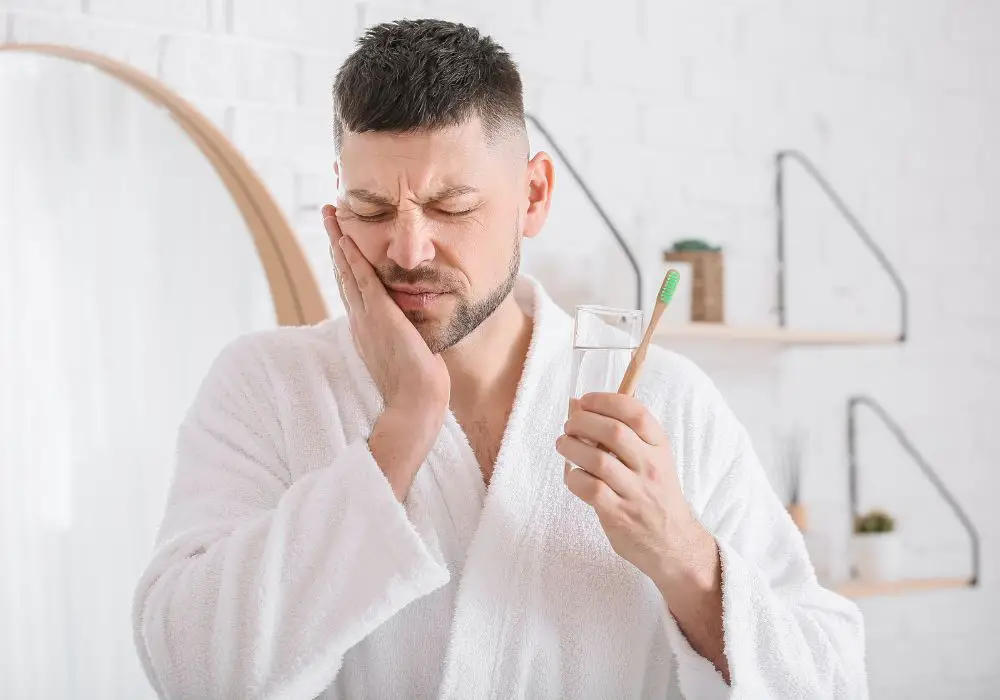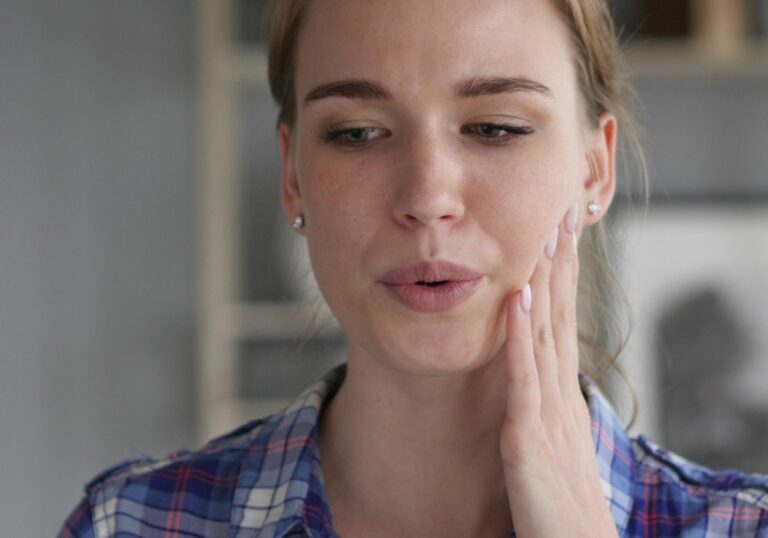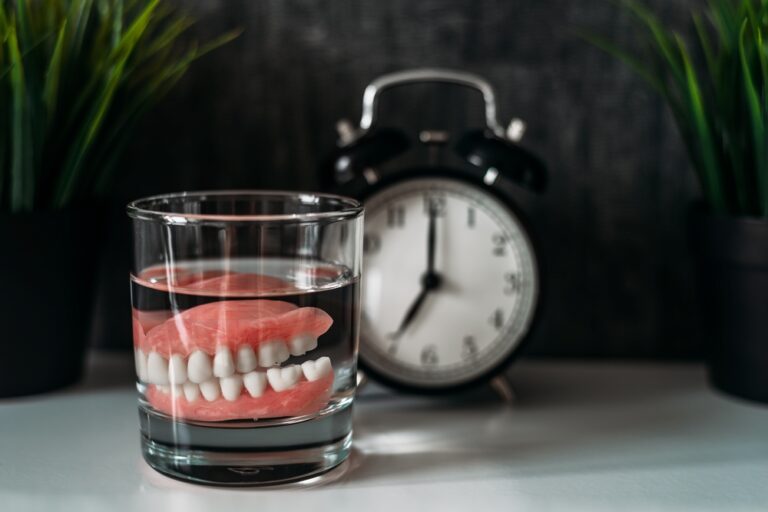Have you ever experienced sudden and intense tooth pain that seems to affect all your teeth at once? If so, you’re not alone. This type of dental pain can be alarming and disruptive to your daily life. However, there are several possible explanations for why your teeth may be hurting suddenly, and there are steps you can take to alleviate the discomfort.
One possible cause of sudden tooth pain is tooth sensitivity. This occurs when the protective enamel on your teeth wears down, exposing the sensitive dentin layer underneath. Certain foods and drinks, such as hot or cold beverages, acidic foods, or sugary treats, can trigger a painful sensation in your teeth. In some cases, tooth sensitivity can be managed with over-the-counter desensitizing toothpaste or a fluoride treatment from your dentist.
Another potential cause of sudden tooth pain is gum disease. When bacteria build up in your mouth, it can lead to inflammation and infection in your gums, which can cause pain and sensitivity in your teeth. Maintaining good oral hygiene habits, such as brushing and flossing regularly and visiting your dentist for cleanings, can help prevent gum disease. If you suspect you may have gum disease, it’s important to seek treatment from your dentist to prevent further damage to your teeth and gums.
Understanding Tooth Pain

Tooth pain can be a distressing experience. It can be sudden and sharp or dull and persistent. There are several causes of tooth pain, including:
- Tooth decay
- Gum disease
- Tooth abscess
- Tooth fracture
- Grinding teeth
- Sinus infection
- Temporomandibular joint (TMJ) disorder
Tooth pain can also be caused by exposure to extreme temperatures, such as hot or cold foods and drinks. Tooth sensitivity is a common problem that affects many people.
If you are experiencing tooth pain, it is important to understand the underlying cause of the pain. This will help you determine the appropriate treatment and prevent further damage to your teeth and gums.
Some tooth pain may be relieved by over-the-counter pain medications, such as ibuprofen or acetaminophen. However, if your tooth pain is severe or persists for more than a few days, you should see a dentist.
Your dentist will examine your teeth and gums to determine the cause of your tooth pain. They may take x-rays or perform other tests to get a better understanding of your dental health.
In some cases, your dentist may recommend a root canal or other dental procedure to treat the underlying cause of your tooth pain. They may also prescribe antibiotics to treat an infection.
Overall, it is important to take tooth pain seriously and seek prompt dental care. With proper treatment, you can relieve your tooth pain and maintain good dental health.
Immediate Steps to Take
Experiencing sudden tooth pain can be a distressing and uncomfortable experience. If you find yourself in this situation, there are several immediate steps you can take to alleviate your symptoms and prevent further damage to your teeth.
- Rinse your mouth with warm salt water: Mix a teaspoon of salt in a glass of warm water and swish the solution around your mouth for 30 seconds before spitting it out. This can help to reduce inflammation and kill bacteria in your mouth.
- Apply a cold compress: Place a cold compress on the outside of your cheek near the affected tooth. This can help to reduce swelling and numb the area, providing temporary relief.
- Take over-the-counter pain medication: Over-the-counter pain medication such as ibuprofen or acetaminophen can help to alleviate tooth pain. Follow the dosage instructions on the label and do not exceed the recommended dose.
- Avoid hard or chewy foods: Stick to soft foods and avoid chewing on the affected tooth until you can see a dentist. This can help to prevent further damage to your tooth and reduce pain.
- Use dental floss: If you suspect that food particles or plaque are causing your tooth pain, use dental floss to gently remove any debris from between your teeth.
Remember, these steps are only temporary measures to alleviate your symptoms. It is important to see a dentist as soon as possible to diagnose the underlying cause of your tooth pain and receive appropriate treatment.
Home Remedies for Tooth Pain

If you’re experiencing sudden tooth pain, you may be able to find relief with some simple home remedies. Here are a few options to try:
Salt Water Rinse
A salt water rinse can help reduce inflammation and kill bacteria in your mouth, which can help alleviate tooth pain. To make a salt water rinse, simply dissolve a teaspoon of salt in a cup of warm water and swish it around in your mouth for 30 seconds before spitting it out. Repeat as needed.
Cold Compress
A cold compress can help numb the area around a painful tooth, which can provide some relief. To make a cold compress, wrap a few ice cubes in a towel or cloth and hold it against your cheek near the affected tooth for 15-20 minutes at a time. Repeat as needed.
Over-the-Counter Pain Relievers
Over-the-counter pain relievers like ibuprofen or acetaminophen can help reduce inflammation and relieve tooth pain. Be sure to follow the recommended dosage on the label and talk to your doctor before taking any new medications.
Remember, home remedies are not a substitute for professional dental care. If you’re experiencing severe or persistent tooth pain, it’s important to see a dentist as soon as possible to identify the underlying cause and receive appropriate treatment.
When to See a Dentist
If your teeth hurt suddenly and the pain persists, it is important to see a dentist. Here are some signs that indicate you should schedule an appointment:
Persistent Pain
If your teeth continue to hurt despite your efforts to alleviate the pain, it is time to see a dentist. Persistent pain could indicate an underlying issue, such as a cavity or an infection, that requires professional treatment. A dentist can examine your teeth and recommend the appropriate treatment to alleviate the pain.
Swelling
Swelling in your gums or face could be a sign of a dental infection. If you notice any swelling, it is important to see a dentist as soon as possible. Delaying treatment could lead to the infection spreading, which could cause more serious health problems.
Fever
If you have a fever along with tooth pain, it is important to see a dentist. A fever could indicate an infection that requires immediate treatment. Your dentist can examine your teeth and recommend the appropriate treatment to alleviate the pain and fever.
Remember, it is important to see a dentist if your teeth hurt suddenly and the pain persists. A dentist can examine your teeth and recommend the appropriate treatment to alleviate the pain and address any underlying issues.
Preventing Future Tooth Pain

To prevent future tooth pain, you should take good care of your teeth and gums. Here are some tips to help you maintain good oral health:
Regular Dental Check-Ups
Regular dental check-ups are important for maintaining good oral health. You should visit your dentist at least twice a year for a check-up and cleaning. During the check-up, your dentist will examine your teeth and gums for any signs of decay or gum disease. If any problems are found, your dentist will recommend treatment.
Good Oral Hygiene
Good oral hygiene is essential for preventing tooth pain. You should brush your teeth at least twice a day with fluoride toothpaste and floss at least once a day. Brushing and flossing help remove plaque and bacteria from your teeth and gums, which can cause tooth decay and gum disease. You should also use mouthwash to help kill bacteria and freshen your breath.
Healthy Diet
A healthy diet is important for maintaining good oral health. You should eat a balanced diet that includes plenty of fruits, vegetables, and whole grains. You should also limit your intake of sugary and acidic foods and drinks, which can cause tooth decay. Drinking plenty of water can also help rinse away food particles and bacteria from your teeth and gums.
By following these tips, you can help prevent future tooth pain and maintain good oral health. Remember to visit your dentist regularly, practice good oral hygiene, and eat a healthy diet.
Frequently Asked Questions
Why do my teeth hurt when I wake up?
There could be several reasons why your teeth hurt when you wake up. One common cause is teeth grinding or clenching during the night, which puts pressure on your teeth and can lead to pain. Another possible cause is sleep apnea, a condition where you stop breathing for short periods during sleep, which can cause your mouth to dry out and your teeth to become sensitive. If you are experiencing pain when you wake up, it’s important to talk to your dentist to determine the underlying cause.
Why do all my teeth hurt?
There are many possible reasons why all your teeth may be hurting suddenly. Some common causes include tooth decay, gum disease, teeth grinding, sinus infections, or even a recent dental procedure. If you are experiencing sudden tooth pain, it’s important to see your dentist to determine the underlying cause and receive appropriate treatment.
How to stop sensitive teeth pain immediately?
If you are experiencing sensitive teeth pain, there are a few things you can try to alleviate the discomfort. One option is to use a desensitizing toothpaste, which can help block pain signals from your teeth. Another option is to avoid foods and drinks that are very hot, cold, or acidic, as these can exacerbate sensitivity. Finally, you can try using a soft-bristled toothbrush and gentle brushing techniques to avoid further irritation.
Top and bottom teeth hurt on right side?
If you are experiencing pain in both your top and bottom teeth on the right side of your mouth, it’s possible that you have a dental issue such as tooth decay or gum disease. It’s important to see your dentist to determine the underlying cause and receive appropriate treatment. In the meantime, you can try using a warm compress on the affected area to alleviate discomfort.
How do I stop my teeth from hurting suddenly?
If you are experiencing sudden tooth pain, there are a few things you can try to alleviate the discomfort. First, try rinsing your mouth with warm saltwater to reduce inflammation. You can also try taking an over-the-counter pain reliever such as ibuprofen. If the pain persists, it’s important to see your dentist to determine the underlying cause and receive appropriate treatment.
How do you relieve nerve pain in your teeth?
If you are experiencing nerve pain in your teeth, it’s important to see your dentist to determine the underlying cause and receive appropriate treatment. In the meantime, you can try using a warm compress on the affected area to alleviate discomfort. You can also try taking an over-the-counter pain reliever such as ibuprofen. Avoid hot or cold foods and drinks, as these can exacerbate nerve pain.







